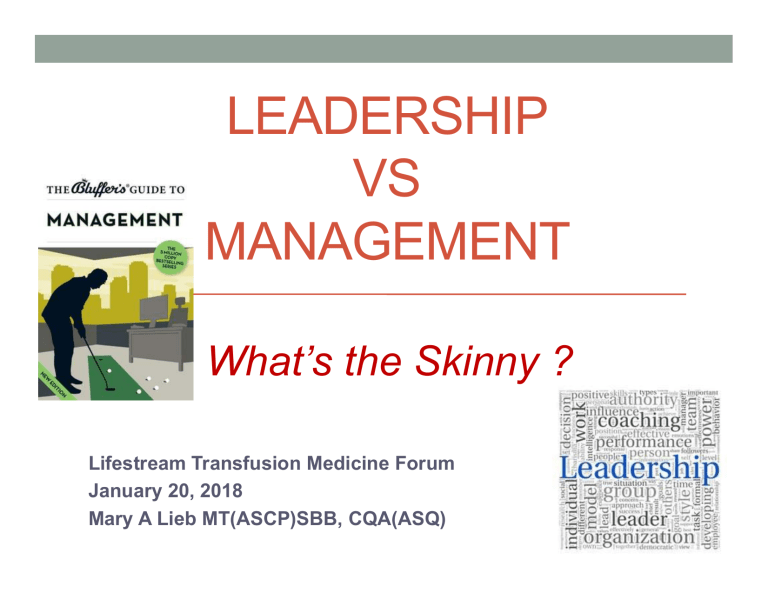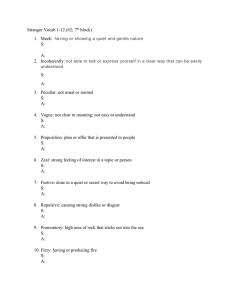
LEADERSHIP VS MANAGEMENT What’s the Skinny ? Lifestream Transfusion Medicine Forum January 20, 2018 Mary A Lieb MT(ASCP)SBB, CQA(ASQ) Objectives • Discuss how leadership and management are different. • Identify ways to become a good leader. • Discuss ways to develop those “quiet” leaders. Management is doing things right; leadership is doing the right things. • Peter Drucker LinkedIn CEO – Jeff Warner “I personally believe Leadership is about the ability to inspire others to achieve shared objectives,” he said. “I think that’s what separates leaders from managers. Managers tell people what to do and leaders inspire them to do it.” The two skill-sets go hand-in-hand. You can’t be very successful at one without the other. Steve Tobak Management Consultant You can become an excellent manager without becoming a good leader, but you cannot be an excellent leader without becoming a good manager What is a Manager ! • A manager is the member of an organization with the responsibility of carrying out the four important functions of management: • planning, • organizing, • leading, • controlling Traits A Managers Possesses #1 The ability to execute a Vision: Managers build a strategic vision and break it down into a roadmap for their team to follow. #2 The ability to Direct: Managers are responsible for day-to-day efforts while reviewing necessary resources and anticipating needs to make changes along the way. #3 Process Management: Managers have the authority to establish work rules, processes, standards, and operating procedures. #4 People Focused: Managers are known to look after and cater to the needs of the people they are responsible for What is a Leader Leaders don’t necessarily hold or occupy a management position. • A leader doesn’t have to be an authority figure in the organization; a leader can be anyone. • Leaders are followed because of their personality, behavior, and beliefs • Leaders are people who challenge the status quo. Leadership is change-savvy, visionary, agile, creative, and adaptive. Are We Born With the Ability to Lead? • Leadership is a learned skill. • You must prepare, practice and hone your skills • Be self aware of your strengths and weaknesses Traits A Leader Possesses #1 Vision: A leader knows where they stand, where they want to go and tend to involve the team in charting a future path and direction. #2 Honesty and Integrity: Leaders have people who believe them and walk by their side down the path the leader sets. #3 Inspiration: Leaders are usually inspirational—and help their team understand their own roles in a bigger context. #4 Communication Skills: Leaders always keep their team informed about what’s happening, both present and the future—along with any obstacles that stand in their way. #5 Ability to Challenge: Leaders are those that challenge the status quo. They have their own style of doing things and problem-solving and are usually the ones who think outside the box. Leadership vs. Management Leadership is: • People more than projects • Movement more than maintenance • Art more than science • Intuition more than formula • Vision more than procedure • Risk more than caution • Action more than reaction • Relationships more than rules • Who you are more than what you do Leaders vs Managers Leaders Vision Change agents Unique Take risks In it for the long haul Grow personally Build relationships Coach Create fans Managers Create goals Status quo Copy Control risk Think short-term Rely on existing, proven skills Build systems and processes Direct Have employees Do You Know A Quiet Leader??? Not a New Concept A leader is best when people barely know he exists, when his work is done, his aim fulfilled, they will say: we did it ourselves. —Lao Tzu 500 BC: Five Levels of Effectiveness Extroverts verses Introverts What does a Quiet Leader Look Like? Quiet Leadership • Quiet leadership is not a style • Character sets quiet leaders apart, not tactics • Employees in organizations that went from good to great described their leaders as quiet, humble, modest, reserved, shy, gracious, mild-mannered, self effacing and understated (Collins 2001) • Correlation between introversion and excellent leadership performance. Famous Quiet Leaders • Mahatma Ghandi • Tony Dungy • Rosa Parks • Douglas Conen • Albert Einstein • Abraham Lincoln • Eleanor Roosevelt • Mark Zuckerburg • Meryl Streep • Sir Isaac Newton • Bill Gates • Steven Spielburg JK Rowlings Characteristics of a Quiet Leader • Lead by Example • Finish What They Start • Passionate and Focused • Inspire trust, build alliances, and acquire expertise • Relational Rather than Authoritative • Teach as They Lead Characteristics of a Quiet Leader • Humble and Gives Credit to Others • Do not like to be the center of attention • Leading from the back promotes autonomy which is what employees want • Influence others by their disposition, not position • Having a likeable and relatable personality • Being approachable and easy to talk to • Accepts Responsibility for Failure. Characteristics of a Quiet Leader • Earns the respect of the team • Displaying confidence, but not overconfidence • Being understanding, compassionate and open-minded • Thinking laterally, not hierarchically • Motivated by building reputations and getting results in the right way – Team Players • Understanding that some situations call for direct, forceful, courageous action. • It’s the exception, not the rule. • Quiet leaders buy time rather than make snap decisions Know the Pitfalls • Tendency to be influenced by appearances • heroes and stars at the top; • shirkers, free riders, and worse are at the bottom • Quiet leaders work on different scale and none of their efforts will be recorded in history books (Badaracco 2002) • From the outside it may seem slow and lumbering, quiet leadership is often the best way to improve organizations Know the Alternatives • Leadership And Influence Don't Always Go Hand-in- Hand • Leadership inherently suggests influence • Influence can result in change, affecting outcomes without necessarily having leadership. • A person can be very influential without a leadership title. • A person can be an ineffective leader who does not influence • Influence Isn't Just For Leaders • Staff can be the glue to hold a process/department together • They create a reputation built on trust, relationships, performance and the ability to see the world and opportunities differently • Critical for team performance and success. How to Identify a Quiet Leader • Influence rather than lead • Excellent listeners • Patience and thoughtful • Question and give suggestions rather than dishing out orders/instructions • High level of flexibility • Influence small groups, group by group • Have influence among peers and management Identifying the Quiet Leader • Look for situations where extraordinary results exist but where no individual steps forward to claim excess credit • Identify someone you know who is very talented but not what is called a typical leader • Find out what that person’s ambitions are • What are their 2 – 5 year goals • Figure out how you are going to help them get there • Support them when they need to be out of their comfort zone. • Encourage them to draw on their natural strengths and not to be something their not. Bottom Line • A leader invents or innovates while a manager organizes. • A manager relies on control whereas a leader inspires trust • A leader asks the questions “what” and “why whereas a manager leans more towards the questions “how” and “when.” In Conclusion Become the kind of leader that people would follow voluntarily; even if you had no title or position. Brian Tracy





